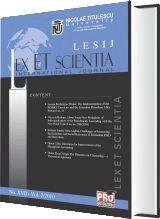OVERVIEW OF THE PROHIBITION OF REFORMATIO IN PEIUS IN THE HUNGARIAN CRIMINAL PROCEDURE
OVERVIEW OF THE PROHIBITION OF REFORMATIO IN PEIUS IN THE HUNGARIAN CRIMINAL PROCEDURE
Author(s): Csongor Herke, Csenge D. TóthSubject(s): Law, Constitution, Jurisprudence
Published by: Universitatea Nicolae Titulescu
Keywords: Reformatio in Peius; Criminal Procedure; Constitutionality; Waving the Prohibition of Reformatio in Peius; Sentencing; Criminal-Policy
Summary/Abstract: The prohibition of reformation in peius has two meanings in the Hungarian legal terminology, such as the prohibition of increasing punishment and the so called reformation in peius. In the effective Hungarian legal system it is regulated, within the rules of the criminal procedure, regarding the ordinary and extraordinary legal remedies, separate procedures and, in addition to the criminal procedure, it is regulated even regarding the law of minor offences. Furthermore, the reformation in peius is not an inevitable consequence of the rule of law, but only a legal favour, and many questions and problems emerge in the light of fundamental principles and constitutionality concerning this prohibition. The prohibition of reformation in peius may be regarded as a legal guarantee for the defence to be able to file an appeal without the risk that the judgment might be altered to detriment of the accused. Therefore, it is a case of favour defensionis and as such it plays a huge role in sentencing, especially when the judgment was appealed in order to increase the severity of sentences. This paper examines the connection between the prohibition of reformation in peius and the principle of constitutionality, as well as the its relation to the aggravating and mitigating factors of sentencing taken into account by the court of appeal.
Journal: LESIJ - Lex ET Scientia International Journal
- Issue Year: XVIII/2011
- Issue No: 1
- Page Range: 18-28
- Page Count: 11
- Language: English

